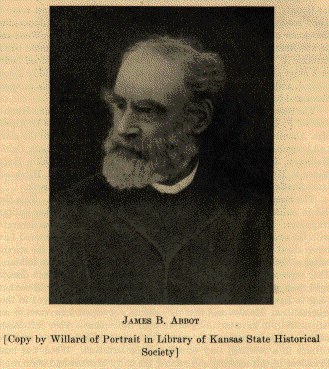James B. Abbott
 MAJ. JAMES B. ABBOTT, one of the pioneer colonists of Lawrence and legislators
of the territory and state, was born at Hampton, Connecticut, December 3, 1818,
and grew to manhood in his native state. He was a member of the third party of
emigrants from New England, which reached Lawrence on October 10, 1854, and soon
became recognized as a free state leader. Major Abbott took up a claim about
half a mile south of Blanton's bridge, on the road to Hickory Point, and his
house was a favorite meeting place of the free state men in that neighborhood.
He was one of those who went east to procure arms, and through his efforts there
were sent to Kansas quite a supply of Sharp's rifles and a twelve-pounder
howitzer. He was one of the party that rescued Branson from the sheriff of
Douglas County, was a lieutenant in command of a company at the first "battle"
of Franklin; commanded the Third Regiment of free state infantry during the
siege of Lawrence in 1856; fought with John Brown and Black Jack, and was the
leader of the expedition that rescued Dr. John Doy. He was a member of the first
House of Representatives elected under the Topeka constitution, and in 1867 was
chosen senator. Upon the adoption of the Wyandotte constitution he was elected a
member of the lower house of the first State Legislature, which met in March,
1861. In that year he was appointed agent for the Shawnee Indians and removed to
De Soto, Johnson County. At the time of the Price raid he led a party of
Shawnees against the Confederates. In 1866 he retired from the Indian agency,
and in the fall of that year was elected to the State Senate. He was influential
in securing the establishment of the School for Feeble Minded Youth. Major
Abbott died at De Soto on March 2, 1879, [Note: research by the State Historical
Society indicates that this date should be 1897] twelve years prior to which
he had served as a director of the State Historical Society.
MAJ. JAMES B. ABBOTT, one of the pioneer colonists of Lawrence and legislators
of the territory and state, was born at Hampton, Connecticut, December 3, 1818,
and grew to manhood in his native state. He was a member of the third party of
emigrants from New England, which reached Lawrence on October 10, 1854, and soon
became recognized as a free state leader. Major Abbott took up a claim about
half a mile south of Blanton's bridge, on the road to Hickory Point, and his
house was a favorite meeting place of the free state men in that neighborhood.
He was one of those who went east to procure arms, and through his efforts there
were sent to Kansas quite a supply of Sharp's rifles and a twelve-pounder
howitzer. He was one of the party that rescued Branson from the sheriff of
Douglas County, was a lieutenant in command of a company at the first "battle"
of Franklin; commanded the Third Regiment of free state infantry during the
siege of Lawrence in 1856; fought with John Brown and Black Jack, and was the
leader of the expedition that rescued Dr. John Doy. He was a member of the first
House of Representatives elected under the Topeka constitution, and in 1867 was
chosen senator. Upon the adoption of the Wyandotte constitution he was elected a
member of the lower house of the first State Legislature, which met in March,
1861. In that year he was appointed agent for the Shawnee Indians and removed to
De Soto, Johnson County. At the time of the Price raid he led a party of
Shawnees against the Confederates. In 1866 he retired from the Indian agency,
and in the fall of that year was elected to the State Senate. He was influential
in securing the establishment of the School for Feeble Minded Youth. Major
Abbott died at De Soto on March 2, 1879, [Note: research by the State Historical
Society indicates that this date should be 1897] twelve years prior to which
he had served as a director of the State Historical Society.
A Standard History of Kansas and Kansans, written and compiled by William E. Connelley, Secretary of the Kansas State Historical Society, Topeka. Chicago: Lewis Publishing Company, copyright 1918; transcribed October, 1997.
![]()
